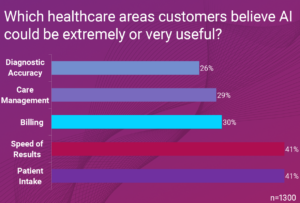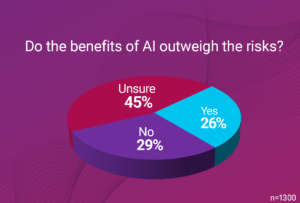
As we delved deeper into the survey results, we discovered that consumers saw the potential near-term utility of AI in healthcare in areas such as administrative tasks, patient intake, and billing. Many respondents believe that AI could streamline these processes and make them more efficient, reducing administrative burdens on healthcare professionals and allowing them to focus on patient care. Additionally, consumers were hopeful that AI could help expedite the delivery of test and lab results, enabling faster and more accurate diagnoses.

However, when it came to more complex aspects of healthcare, such as care management and diagnostic accuracy, consumers are less comfortable with AI playing a major role. They recognize the complexities and nuances of healthcare, and the importance of human judgment and expertise in making critical decisions. They value the relationship and trust they have with their healthcare providers and are hesitant about relying solely on AI for such important aspects of their care.
In fact, the research showed that the largest segment of consumers, 45% of respondents, are unsure if the benefits outweigh the risks. The remaining survey participants are split almost evenly between supporters (26% of people feel the benefits are worth the risk) and detractors (29% expressed concerns that the risks outweigh the benefits).

The research focused specifically on AI in healthcare.
Consumers have valid concerns about accuracy, potential biases, data privacy, and job displacement that need to be addressed to ensure responsible and ethical use of AI in healthcare. This made a lot of sense to us. As healthcare professionals ourselves, we knew that AI could be a valuable tool in certain areas of healthcare, but not as a substitute for the knowledge, experience, and empathy that healthcare providers bring to patient care. Maintaining the human connection in healthcare goes beyond administrative tasks and involves building trust, understanding patient preferences, and providing emotional support.
In the near term, AI in healthcare will require continuous monitoring, validation, and transparency. Establishing guidelines and regulations to mitigate risks, ensure patient safety, and protect patient rights will be crucial. This study clearly reinforced the belief that AI should be seen as a supportive tool rather than a replacement for healthcare professionals. If implemented ethically and thoughtfully, AI could enable healthcare professionals to deliver better care by reducing administrative burdens, expediting processes, and providing valuable insights for decision-making.

